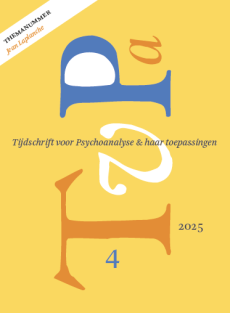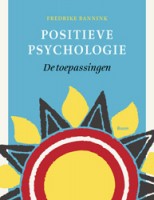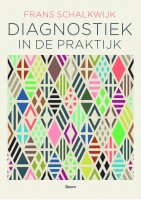Psychoanalytische reflecties over zelf en object in alcoholisme
Summary
Psychoanalytic reflections on self and object in alcoholism
This article is intended to help create a post-Kleinian framework in which a deeper understanding of alcoholism is possible. In alcoholism, self and object are constituted in a specific way. Consideration of early development leads to the description of an alcoholic part of the self of an alcohol-dependent patient. This archaic part of the self has autistic and psychotic features and exists next to the healthy part of the personality.
Key words:
alcoholic object, alcoholic part of the self, alcoholism, autistic, psychoanalysis
Literatuur
- Bekelynck, I. & Fraysse, P. (2003). Temps, musicothérapie et alcoolisme. Alcoologie et Addictologie, 25,131-137.
- Bergeret, J. (1990). Les toxicomanes parmi les autres. Parijs: Éditions Odile Jacob.
- Brickman, B. (1988). Psychoanalysis and substance abuse: toward a more effective approach. Journal of the American Academy of Psychoanalysis, 16 (3), 359-379.
- Faoro-Kreit, B. (1997). Quand les patients boivent, les analystes trinquent. Revue Belge de Psychanalyse, 30, 87-105.
- Fenichel, O. (1945). The psychoanalytic theory of neurosis. Londen: W.W. Norton & Company.
- Hebbrecht, M. (1997). Bouwen aan een basis. Aspecten van behandeling bij middelengebruikers. Sint-Truiden: Psychiatrisch Ziekenhuis Sancta Maria.
- Hebbrecht, M. (2001). Beschouwingen over regressie op afdelingsniveau. Tijdschrift voor Psychoanalyse, 4, 221-232.
- Hebbrecht, M. (2004). De psychiater als steunfiguur. Een psychoanalytische visie. Tijdschrift voor Psychiatrie, 46, 157-166.
- Hurst, D.M. (1995). Transitional and autistic phenomena in addictive behavior. In S. Dowling (red.), The psychology and treatment of addictive behavior (p. 163-174). Madison: International Universities Press.
- Keller, L. (1992). Addiction as a form of perversion. Bulletin of the Menninger Clinic, 56/2, 221-231.
- Khan, M. (1989). Hidden selves: between theory and practice in psychoanalysis. Londen: Karnac Books.
- Kohut, H. (1977). Self deficits and addiction. In J.D. Levin & R.H. Weiss (red.) (1994), The dynamics and treatment of alcoholism: essential papers (p. 344-346). North Vale/New Jersey/ Londen: Jason Aronson.
- Letarte, P. (1981). Le toxicomane, sa drogue et le psychothérapeute. In J. Bergeret & F. Fain (red.), Le psychanalyste à l’écoute du toxicomane (p. 125-132). Parijs: Dunod.
- Levin, J.D. (1991). Treatment of alcoholism and other addictions: a self psychology approach. North Vale/New Jersey/Londen: Jason Aronson.
- Levin, J.D. & Weiss, R.H. (red.) (1994). The dynamics and treatment of alcoholism: essential papers. North Vale/New Jersey/ Londen: Jason Aronson.
- Loose, R. (2002). The subject of addiction. Psychoanalysis and the administration of enjoyment. Londen: Karnac Books.
- McDougall, J. (1989). Theatres of the body. Londen: Free Association Books.
- McDougall, J. (1995). The many faces of eros: a psychoanalytic exploration of human sexuality. Londen: Free Association Books.
- Meissner, W.W. (1980). Addiction and paranoid process: psychoanalytic perspectives. International Journal of Psychoanalytic Psychotherapy, 8, 273-310.
- Mijolla, de A. & Shentoub, S.A. (1973). Pour une psychanalyse de l’alcoolisme. Parijs: Petite Bibliothèque Payot.
- Monjauze, M. (1991). La problématique alcoolique. Parijs: Dunod.
- Monjauze, M. (1999). La part alcoolique du soi: La prise en charge clinique des patients alcooliques. Parijs: Dunod.
- Monjauze, M. (2001a). Comprendre et accompagner le patiënt alcoolique: Des entretiens individuels et familiaux au travail de groupe. Parijs: Editions in Press.
- Monjauze, M. (2001b). Psychanalyse de l’ objet, objet-drogue, objet-alcool. Carnet-Psy, 61, 17-22.
- Monjauze, M. (2003). Persoonlijke mededeling per brief.
- Ogden, T. (1989). The primitive edge of experience. Londen: Jason Aronson.
- Rost, W.D. (2001). Psychoanalyse des Alkoholismus. Stuttgart: Klett-Cotta.
- Skolnick, V. (1979). The addictions as pathological mourning: an attempt at restitution of early losses. American Journal of Psychotherapy, 2, 281-290.
- Tustin, F. (1986). Autistic barriers in neurotic patients. Londen: Karnac Books.
- Vandermeeren, R. (1998). Luisteren naar de verslaafde patiënt: psychoanalytische visies op alcoholisme. Tijdschrift voor Klinische Psychologie, 4, 257-277.
- Vandermeeren, R. (2001). Luisteren naar de verslaafde patiënt in groep: psychoanalytisch georiënteerde groepspsychotherapie voor alcoholisten, Tijdschrift voor Psychotherapie, 27, 169-186.
- Vandermeeren, R. (2002). Psychotherapie-groepen voor alcoholisten. In J.J.C., Berk (red.), Handboek voor Groepspsychotherapie, N2, (p. 1-33), Houten/Diegem: Bohn Stafleu Van Loghum.
- Vermote, R. (2003). De cirkel van de herhaling. In A. De Bruyne & W. Heuves (red.), De ezel en de steen. Over psychoanalyse en herhaling (p. 13-24). Amsterdam: Boom.
- Winnicott, D.W. (1971). Playing and reality. Londen: Routledge.
- Wurmser, L. (1984). The role of superego conflicts in substance abuse and their treatment. International Journal of Psychoanalytic Psychotherapy, 10, 227-258.
- Yalisove, D.L. (red.) (1997). Essential papers on addiction. New York: New York University Press.
 © 2009-2026 Uitgeverij Boom Amsterdam
© 2009-2026 Uitgeverij Boom Amsterdam
ISSN 1382-516x
De artikelen uit de (online)tijdschriften van Uitgeverij Boom zijn auteursrechtelijk beschermd. U kunt er natuurlijk uit citeren (voorzien van een bronvermelding) maar voor reproductie in welke vorm dan ook moet toestemming aan de uitgever worden gevraagd:
Behoudens de in of krachtens de Auteurswet van 1912 gestelde uitzonderingen mag niets uit deze uitgave worden verveelvoudigd, opgeslagen in een geautomatiseerd gegevensbestand, of openbaar gemaakt, in enige vorm of op enige wijze, hetzij elektronisch, mechanisch door fotokopieën, opnamen of enig andere manier, zonder voorafgaande schriftelijke toestemming van de uitgever.
Voor zover het maken van kopieën uit deze uitgave is toegestaan op grond van artikelen 16h t/m 16m Auteurswet 1912 jo. Besluit van 27 november 2002, Stb 575, dient men de daarvoor wettelijk verschuldigde vergoeding te voldoen aan de Stichting Reprorecht te Hoofddorp (postbus 3060, 2130 KB, www.reprorecht.nl) of contact op te nemen met de uitgever voor het treffen van een rechtstreekse regeling in de zin van art. 16l, vijfde lid, Auteurswet 1912.
Voor het overnemen van gedeelte(n) uit deze uitgave in bloemlezingen, readers en andere compilatiewerken (artikel 16, Auteurswet 1912) kan men zich wenden tot de Stichting PRO (Stichting Publicatie- en Reproductierechten, postbus 3060, 2130 KB Hoofddorp, www.cedar.nl/pro).
No part of this book may be reproduced in any way whatsoever without the written permission of the publisher.
Nieuwsbrief Boom Psychologie
Meld u nu aan en ontvang maandelijks de Boom Psychologie nieuwsbrief met aantrekkelijke aanbiedingen en de nieuwe uitgaven.
Aanmelden


